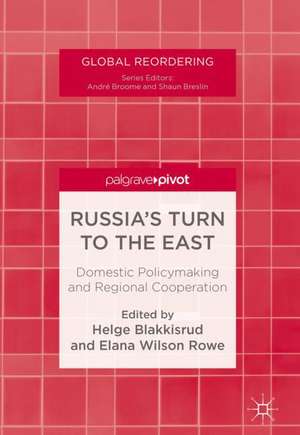Russia's Turn to the East: Domestic Policymaking and Regional Cooperation: Global Reordering
Editat de Helge Blakkisrud, Elana Wilson Roween Limba Engleză Hardback – 12 ian 2018
This book explores if and how Russian policies towards the Far East region of the country – and East Asia more broadly – have changed since the onset of the Ukraine crisis and Russia’s annexation of Crimea. Following the 2014 annexation and the subsequent enactment of a sanctions regime against the country, the Kremlin has emphasized the eastern vector in its external relations. But to what extent has Russia’s 'pivot to the East' intensified or changed in nature – domestically and internationally – since the onset of the current crisis in relations with the West? Rather than taking the declared 'pivot' as a fact and exploring the consequences of it, the contributors to this volume explore whether a pivot has indeed happened or if what we see today is the continuation of longer-duration trends, concerns and ambitions.
Preț: 224.92 lei
Nou
Puncte Express: 337
Preț estimativ în valută:
43.04€ • 45.03$ • 35.75£
43.04€ • 45.03$ • 35.75£
Carte tipărită la comandă
Livrare economică 02-16 aprilie
Preluare comenzi: 021 569.72.76
Specificații
ISBN-13: 9783319697895
ISBN-10: 3319697897
Pagini: 168
Ilustrații: XIII, 167 p. 17 illus., 13 illus. in color.
Dimensiuni: 148 x 210 mm
Greutate: 0.45 kg
Ediția:1st ed. 2018
Editura: Springer International Publishing
Colecția Palgrave Pivot
Seria Global Reordering
Locul publicării:Cham, Switzerland
ISBN-10: 3319697897
Pagini: 168
Ilustrații: XIII, 167 p. 17 illus., 13 illus. in color.
Dimensiuni: 148 x 210 mm
Greutate: 0.45 kg
Ediția:1st ed. 2018
Editura: Springer International Publishing
Colecția Palgrave Pivot
Seria Global Reordering
Locul publicării:Cham, Switzerland
Cuprins
Chapter 1. Gateway or garrison? Border regions in times of geopolitical crisis.- Chapter 2. An Asian pivot starts at home: The Russian Far East in Russian regional policy.- Chapter 3. Primorskii Krai and Russia’s ‘turn to the East’: A regional view.- Chapter 4. Promoting new growth: ‘Advanced special economic zones’ in the Russian Far East.- Chapter 5.The Russian Far East and Russian security policy in the Asia–Pacific region.- Chapter 6. Energy Relations between China and Russia after Crimea.- Chapter 7. Russia, China and the Shanghai Cooperation Organization: Diverging security interests and the ‘Crimea effect’.- Chapter 8. Russia’s new Asian tilt: How much does economy matter?.- Chapter 9. Afterword: 6,400 kilometres away – but not a policy world apart.
Notă biografică
Helge Blakkisrud is Head of the Research Group on Russia, Eurasia and the Arctic at the Norwegian Institute of International Affairs (NUPI), Norway. His research interests include Russian regional politics, centre–region relations and federalism, as well as nation-building, nationalism and national identity in Russia and Eurasia. His most recent books are The Governors’ Last Stand: Federal Bargaining in Russia's Transition to Appointed Regional Heads, 2005–2009 (2015) and The New Russian Nationalism: Imperialism, Ethnicity and Authoritarianism, 2000–2015 (co-edited with Pål Kolstø, 2016).
Elana Wilson Rowe is Head of the Research Group on Emerging Powers and International Development at the Norwegian Institute of International Affairs (NUPI), Norway; and Adjunct Professor at Nord University, Norway. Her present research interests include Russian foreign policy, particularly in the areas of energy and climate change, and Arctic politics. She is theauthor of Russian Climate Politics (2013), editor of Russia and the North (2009) and co-editor of The Multilateral Dimension in Russian Foreign Policy (with Stina Torjesen, 2009) and Russia’s Encounter with Globalization (with Julie Wilhelmsen, 2011)
Elana Wilson Rowe is Head of the Research Group on Emerging Powers and International Development at the Norwegian Institute of International Affairs (NUPI), Norway; and Adjunct Professor at Nord University, Norway. Her present research interests include Russian foreign policy, particularly in the areas of energy and climate change, and Arctic politics. She is theauthor of Russian Climate Politics (2013), editor of Russia and the North (2009) and co-editor of The Multilateral Dimension in Russian Foreign Policy (with Stina Torjesen, 2009) and Russia’s Encounter with Globalization (with Julie Wilhelmsen, 2011)
Textul de pe ultima copertă
This book is open access under a CC BY license.
Helge Blakkisrud is Head of the Research Group on Russia, Eurasia and the Arctic at the Norwegian Institute of International Affairs (NUPI), Norway. His research interests include Russian regional politics, centre–region relations and federalism, as well as nation-building, nationalism and national identity in Russia and Eurasia. His most recent books are The Governors’ Last Stand: Federal Bargaining in Russia's Transition to Appointed Regional Heads, 2005–2009 (2015) and The New Russian Nationalism: Imperialism, Ethnicity and Authoritarianism, 2000–2015 (co-edited with Pål Kolstø, 2016).
Elana Wilson Rowe is Head of the Research Group on Emerging Powers and International Development at the Norwegian Institute of International Affairs (NUPI), Norway; and Adjunct Professor at Nord University, Norway. Her present research interests include Russian foreign policy, particularly in the areas of energy and climate change, and Arctic politics. She is the author of Russian Climate Politics (2013), editor of Russia andthe North (2009) and co-editor of The Multilateral Dimension in Russian Foreign Policy (with Stina Torjesen, 2009) and Russia’s Encounter with Globalization (with Julie Wilhelmsen, 2011).
Elana Wilson Rowe is Head of the Research Group on Emerging Powers and International Development at the Norwegian Institute of International Affairs (NUPI), Norway; and Adjunct Professor at Nord University, Norway. Her present research interests include Russian foreign policy, particularly in the areas of energy and climate change, and Arctic politics. She is the author of Russian Climate Politics (2013), editor of Russia andthe North (2009) and co-editor of The Multilateral Dimension in Russian Foreign Policy (with Stina Torjesen, 2009) and Russia’s Encounter with Globalization (with Julie Wilhelmsen, 2011).
Caracteristici
Analyses the implementation of Russia’s turn to the East after the annexation of Crimea Deals with recent developments of Russia’s turn to Asia and Russian-Western crisis Timely study of Russian regional politics, Russian foreign policy, and East Asian politics and economy





